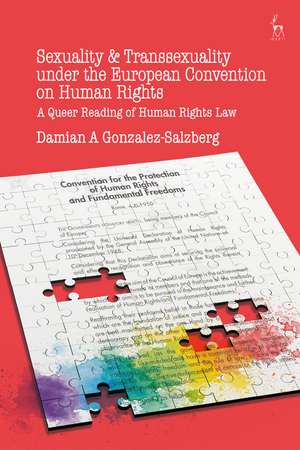Sexuality and Transsexuality Under the European Convention on Human Rights: A Queer Reading of Human Rights Law
Autor Dr Damian A Gonzalez Salzbergen Limba Engleză Paperback – 23 sep 2020
Preț: 237.57 lei
Preț vechi: 305.66 lei
-22% Nou
Puncte Express: 356
Preț estimativ în valută:
45.46€ • 47.59$ • 37.61£
45.46€ • 47.59$ • 37.61£
Carte tipărită la comandă
Livrare economică 07-21 aprilie
Preluare comenzi: 021 569.72.76
Specificații
ISBN-13: 9781509945306
ISBN-10: 150994530X
Pagini: 248
Dimensiuni: 156 x 234 mm
Greutate: 0.35 kg
Editura: Bloomsbury Publishing
Colecția Hart Publishing
Locul publicării:London, United Kingdom
ISBN-10: 150994530X
Pagini: 248
Dimensiuni: 156 x 234 mm
Greutate: 0.35 kg
Editura: Bloomsbury Publishing
Colecția Hart Publishing
Locul publicării:London, United Kingdom
Caracteristici
Anchors study in case of law of (arguably) the foremost adjudicator of human rights, the European Court of Human Rights
Notă biografică
Damian A Gonzalez-Salzberg is a Lecturer in Law at the University of Sheffield.
Cuprins
1. An Introduction to Queer(ing) Human Rights Law I. The Method and the Methodology of the Book II. The European Court of Human Rights III. Homosexuality and Transsexuality before the Court IV. A (Working) Definition of Queer Theory V. Queer Legal Theory VI. Queering Human Rights Law VII. Outline of the Book 2. The Court's Conception of Gender I. Introduction II. The Sexed/Gendered Subject of Human RightsIII. The Legal Meaning of Sex IV. Reconstructing the Legal Meaning of Gender V. The Transsexual Creation of Surgery and the Law VI. A Human Right to Gender Affirming Surgery? VII. Overcoming a Genitocentric Case Law VIII. Revisiting the Gender In-Between IX. Conclusion 3. (Homo)Sexuality before the Court I. Introduction II. The (Hetero)Sexual Subject of Human Rights III. The Protection of Another Sexual Identity IV. Homosexuality as a Public Identity V. The Court's (Western) Understanding of SexualityVI. The Construction of a Sexual Predisposition VII. A (Mutable) Immutable Sexuality VIII. Narratives of Homosexual Identity IX. Conclusion 4. LGBT Families and Non-discrimination I. Introduction II. The Prohibition of Discrimination under the Convention III. The Privileged Heterosexual Married Couple IV. The Protection of the 'Family in the Traditional Sense' V. Homonormativity as an LGBT Strategy VI. Problems with (Non-)Discrimination VII. Conclusion 5. Of Marriage, Partnerships and Parenthood (and Marriage Once Again) I. Introduction II. The Heterosexual Right to Marry III. Heterosexual(ising) Marriage's History IV. LGBT Parenthood V. Conclusion 6. A Queer(er) Human Rights Jurisprudence I. Introduction II. Same-Sex Marriage before the Court III. Revisiting Transsexual Marriage after GoodwinIV. Que(e)rying the Privileged Character of Marriage V. Re-thinking Second-Parent Adoption VI. Conclusion 7. Conclusion
Recenzii
A valuable contribution to the literature on the Court's heteronormativity. Furthermore, the book is a functional introduction for readers interested in familiarising themselves with queer theoretical critiques and becoming familiar with the ECtHR's ever-growing body of case law concerning sexualities.
